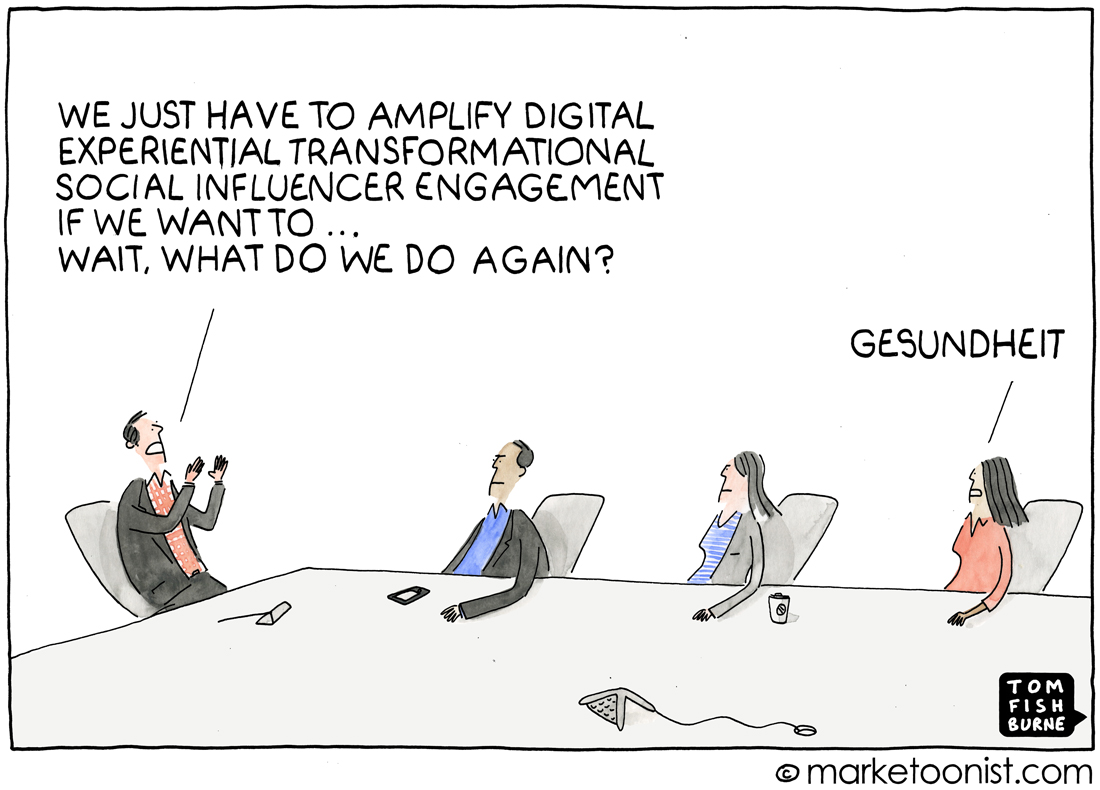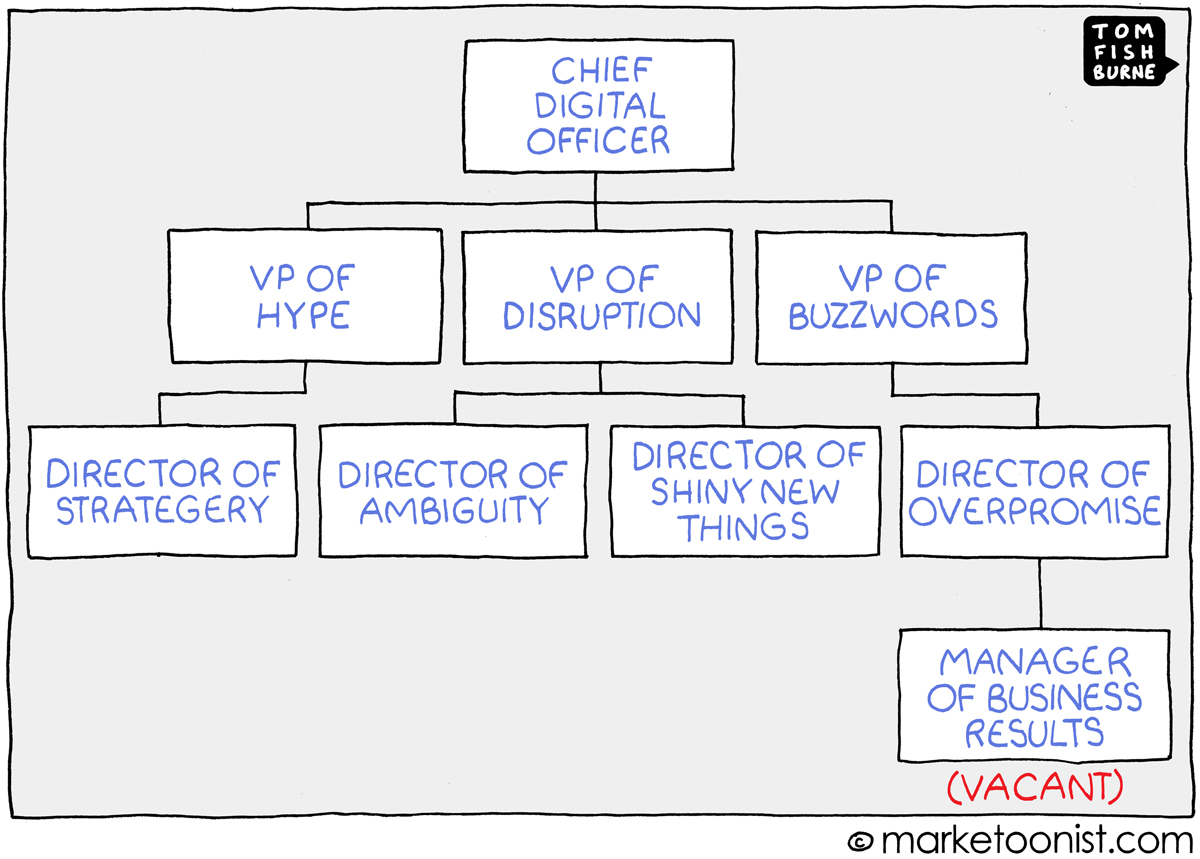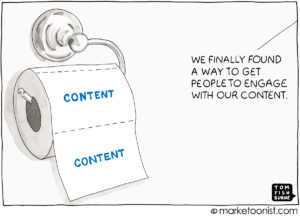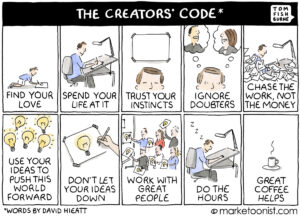“It is not about doing ‘digital marketing’, it is about marketing effectively in a digital world.”
I really like this quote from Diageo CEO Ivan Menezes. It keeps the technology in perspective, relative to the consumer. It puts the onus on everyone, not just those with digital in their job title.
In contrast, many organizations treat it as “doing digital.” Some have even created a new C-level role called the Chief Digital Officer. Floating somewhere between a CMO and a CIO, McKinsey describes the CDO role as “Transformer in Chief.”
Giving “Digital” C-level focus appears to give “Digital” a high level of strategic priority, but it also treats it as a silo, distinct from the rest of the business. It can be heavy on hype and light on substance. It can obviate the responsibility of everyone in an organization to figure out how to do what they do better with digital technology.
I found a telling Chief Digital Officer story at a healthcare company:
“A recently-named chief digital officer took a trip to California to visit Google, where he ended up cruising around Mountainview in a smart car. The CDO had recently been promoted by health care provider employer.
“In the meantime his clinician colleagues were meeting with a software vendor about streaming patient vital signs to their smart devices, allowing them to provide care away from the bedside.
“Rather than giving the CDO the prestige he’d intended, the Silicon Valley sojourn was widely ridiculed as a boondoggle. It had nothing to do with what how the healthcare network needed to exploit digital for patient care.”
The use of the word “digital” reminds me of the use of the term “e-business” in the late 90’s. A whole crop of “e-business” consultancies, agencies, and job titles suddenly emerged to help companies figure out how “the rules of business had changed.” IBM popularized the “e-business” term in a 1997 ad campaign.
Thinking about “digital” too much as “transformation” can blind us from seeing the opportunities directly in front of us. As Professor Mark Ritson described it: “It’s impossible to find an Archimedean point where digital ends and so-called ‘traditional’ channels begin.”
Here’s a related cartoon I drew last year on this topic. I’d love to hear your thoughts.




Julie says
Marketing tactics change but strategy stays the same. It’s the age old confusion over what is a strategy vs. a tactic. A tactic does not require a c-level and as you said creating one can result in a silo.
Manfredi Sassoli says
I agree partly. Digital can create new business models and that may influence strategy.
GK says
This is all, ultimately, about selling a product or service. If everyone’s efforts don’t result in a customer (new or existing) putting money down for your product or service, then it’s wasted effort. If you can sell it but can’t build it, you fail. If you can build it but can’t sell it, you fail.
The “digital” bit is just another tool in the toolbox. It isn’t a panacea. It isn’t a silver bullet. You may find that, for your customer base, digital marketing makes zero sense. For others, some kind of digital marketing strategy is of prime importance. There is no one-size-fits-all solution here.
But it only works if everyone (product development, marketing, sales, support) is working together to deliver what the customer wants for a price they are willing to pay. Take away any one of those pieces, and the whole structure comes tumbling down.
Himanshu says
Agree on your point…
at the end it all boils down to the point “will the activity influence consumers to buy the product”
We have seen that the mode of communication keep on changing but the end goal remains the same.
Alberto Vildosola says
Nailed it. I’m a 30+ years of experience “digital” worker. Perhaps too old for the new age of nonsense.
Lisa says
Totally concur with the article, Julie and GK. And I think Ivan’s quote is spot on! We don’t need a “digital marketer or a “revenue” marketer (isn’t generating revenue inherent in being a marketer??) or a “latest phase of the day” marketer. We need marketers (strategist) who know how to utilize marketing tools (tactics) to best address the needs of their customer and their business in order to drive revenue/ profit.
Tom says
if you’re a Chief Digital Officer & you’re just looking at Marketing – you’re not a Chief Digital Officer
Neha says
I agree with GK here – it depends on who the target customer is, and how the company plans to attract them. Companies can also use the Innovation Adoption Cycle to ensure their product or service is recognized by their target market!
Allen Roberts says
Love it Tom, and well done Martha!
Augusto says
Quote is spot on, many of us in organizations have at some point lost sight of the business & marketing fundamentals in light of the many ‘potential’ opportunities and abundance of measures digital provides. Linked to your recent article on these measures that don’t build the business at all. Also many players, big guys like Facebook and Google, or smaller ones like agencies might want to trick you into ‘this is new and you don’t know’ so you get carried away vs. leveraging digital as another medium and way of interacting with consumers. I find it most helpful to be very clear on the goals and strategies, and think of the unique role digital can bring to address these in line with the marketing drivers that are true regardles so of the medium (sufficient reach with a relevant message at the most relevant time).
carl says
The scope should not be only marketing, although this is clearly a part of business. Let’s rework the quote;
It’s not about doing digital transformation. It’s about doing business better in a digital world.
Any CDO should not ‘float’ between CMO and CFO, but cut across all C-suite roles. It is their job to make sure everyone knows it is their responsibility to smooth the customer journey.
In some cases this may be transformative, in others not.
Gary Dietz says
Growth hacker = Salesperson who knows how to market and sell who is probably too young to realize that other people know how to do what they do in fewer hours a day, but who works 18 hours a day anyway.
Chief Digital Officer = Salesperson who knows how to market and sell who knows tools and knows how to report out to the “C” level suite well enough until they are replaced by someone who knows how to report out better.
Chief Revenue Office = Salesperson who knows how to market and sell who has an MBA and can report out to C level folks really well and can manage people.
Product Marketing Manager = Marketing person who knows how to market and sell.
Product Manager = Should be a person who knows how to talk to customers, create products that will sell, and helps salespeople and marketing people sell and market them. But probably is just an engineer who thought they could market.
Content Marketing Manager = A marketing person who knows how to write well, has some editorial strategy, can market, and who will be replaced by a person doing the same thing with a new title in 2.5 years.
Marcomm person = A marketing person who knows how to sell, who usually creates stuff too late in the cycle, who role is often mistaken for “marketing” by young engineers who have no idea what marketing really means.